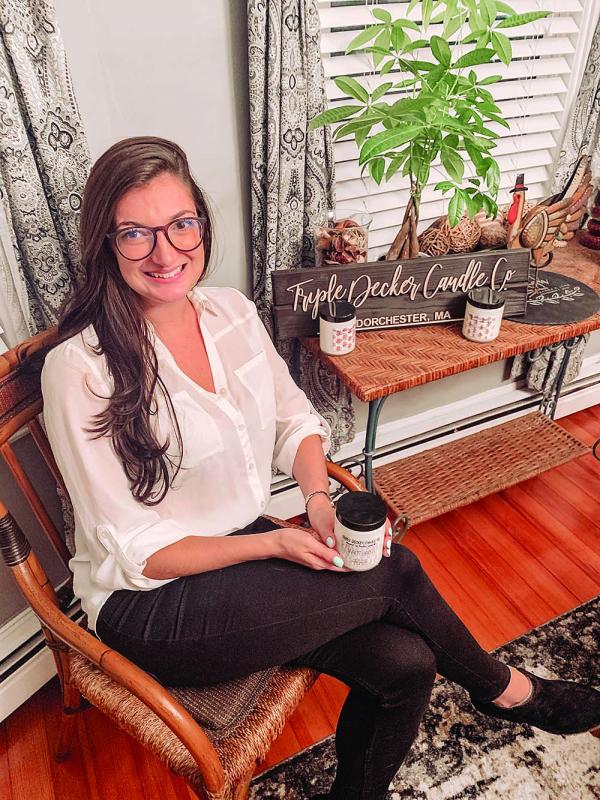November 11, 2020

Joanna Keough makes and sells candles from her home in Lower Mills.
Low interest rates, the inability to leave our homes, and the desire for larger and more comfortable space has led to a home renovation boom in the US. Since last March, the demand on building materials has gone up by 16.8 percent, according to a Census Bureau estimate, with home contractors booked solid.
Last May, I moved to the Ashmont-Adams neighborhood, leaving the comfort of familiar Jamaica Plain for my own single family on the relatively unfamiliar Carruth Hill. Having never set foot in this particular section of Boston prior to my soon-to-be home’s open house, taking the leap during a global pandemic added another layer of isolation and uncertainty to the already fraught process of moving.
Luckily, the house I bought had been neglected for many years and required substantial cosmetic upgrades. With no restaurants or bars to frequent, friends unable to visit with any regularity, and travel off the table (I postponed, then canceled my planned trip to London and Southern England), I threw myself into renovations.
While the project is far from finished, the results explain why so many people around the country have embraced renovations during the pandemic slog. I have a freshly painted personal retreat with new floors, a veritable jungle of recently acquired houseplants and the space to entertain if the world ever again permits such frivolity.
And I’m not alone in finding new ways to while away the hours as the world remains in a perpetual pause.
Savin Hill resident Kirill Shklovsky, who works for Twitter, has been working from home since March. In his free time, he took up playing the ukulele and singing, taking one-on-one lessons via YouTube. He finds the music to be a welcome outlet for his emotions during all of the uncertainty, and he leans on ballads like Leonard Cohen’s Hallelujah, Ripple by the Grateful Dead, and Boston standby Sweet Caroline by Neil Diamond, to express himself.
“I like playing sad songs, and when the whole SCOTUS thing was happening, it was nice to feel sad and be able to express that sadness through music,” said Shklovsky. “If I can cry a little, it helps me get through this a bit.”
Shklovsky plans to continue his music lessons beyond the coronavirus phase, saying that it’s creative and challenging and gives him something to work on. And he recognizes that he is one of the lucky ones who has the agency to do something of this nature.
“I’m super lucky to be able to pay for this because I still have a job, and I don’t have to worry about losing my job or getting sick at work,” said Shklovsky. “I appreciate that not everyone has this option.”
Johanna Keough, who lives in Lower Mills, took her coronavirus hobby even further: She has begun selling handmade candles in local stores and via Instagram. She always has a candle burning at the end of the day, and it has become a signal to her that it’s time to chill.
“When dinner is made and the dishes are done, I light a candle and begin to relax,” said Keough. “But I started doing more research and realized that a burning candle could be dangerous for my family.”
During the early days of quarantine, Keough started researching candles from big box stores and found that they could contain dangerous toxins. Keough decided to make her own candles for the family using all-natural suppliers for 100 percent soy and beeswax options, and scents that are 100 percent phthalate-free, including popular choices like white tea, hazelnut coffee, bamboo, and coconut.
At the beginning of the lockdown, she made them for herself and friends, but in June, she began to sell them through her Instagram page, @TripleDeckerCandleCo.
In addition to Instagram, Keough sells at two area shops: Minter & Richter Designs in Port Norfolk and Denise Hajjar Boutique in Marina Bay in Quincy. She has moved Triple Decker Candle Company from her kitchen to her basement and hopes to continue with an office or storefront after the pandemic is over.
Keough works in the MIT alumni office and makes candles every night after dinner until about 10 p.m. She finds the creative process relaxing and looks forward to expanding her business in the coming years.
In May, the Mayo Clinic noted that “a distraction can get you away from the cycle of negative thoughts that feed anxiety and depression,” and “doing something positive to manage anxiety is a healthy coping strategy.” With the coronavirus rearing its ugly head again as we head into New England winter, finding a positive way to occupy yourself can help keep Dorchester both mentally and physically healthy.
Erin Caldwell lives in Dorchester and is a regular contributor to the Reporter. Follow her —and send her ideas— on Twitter: @ErinDCaldwell.


